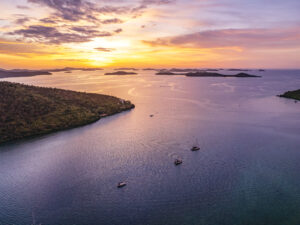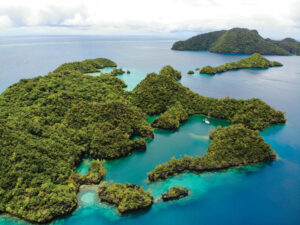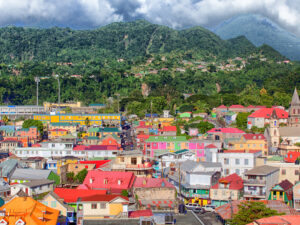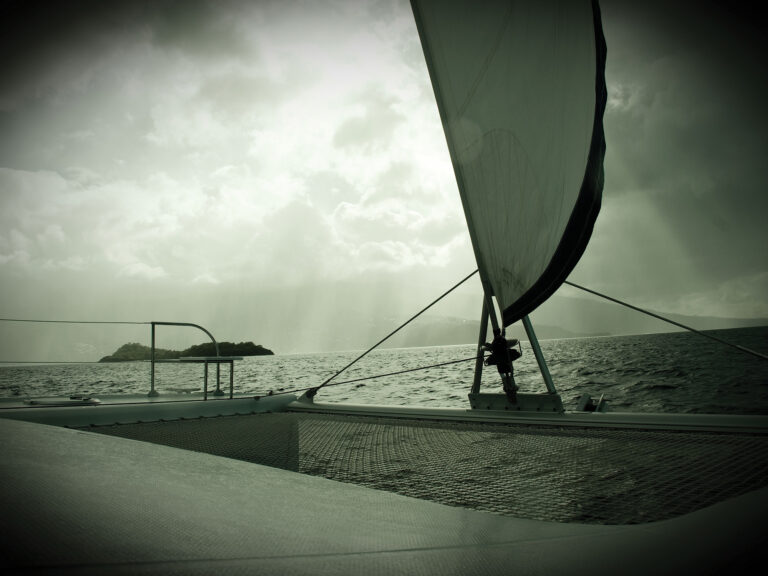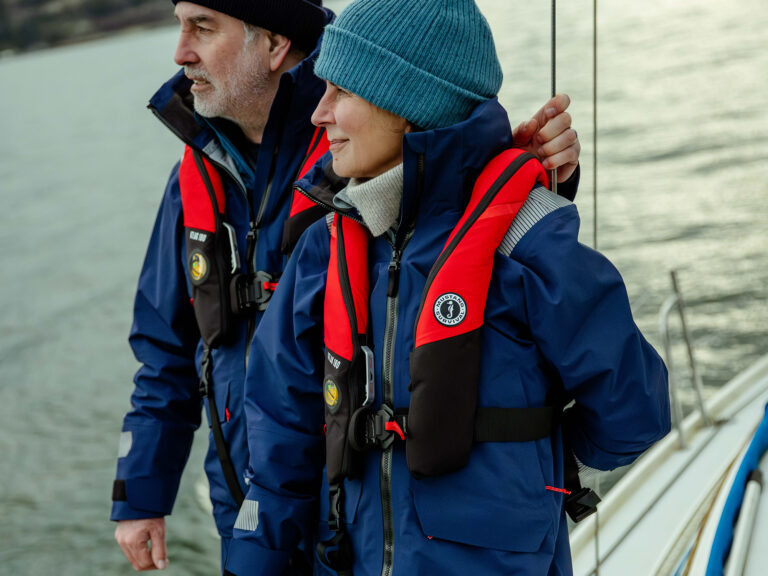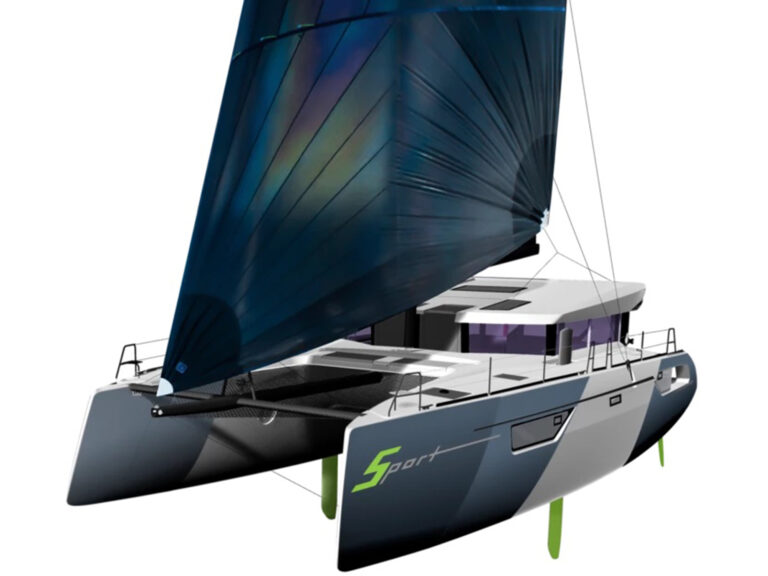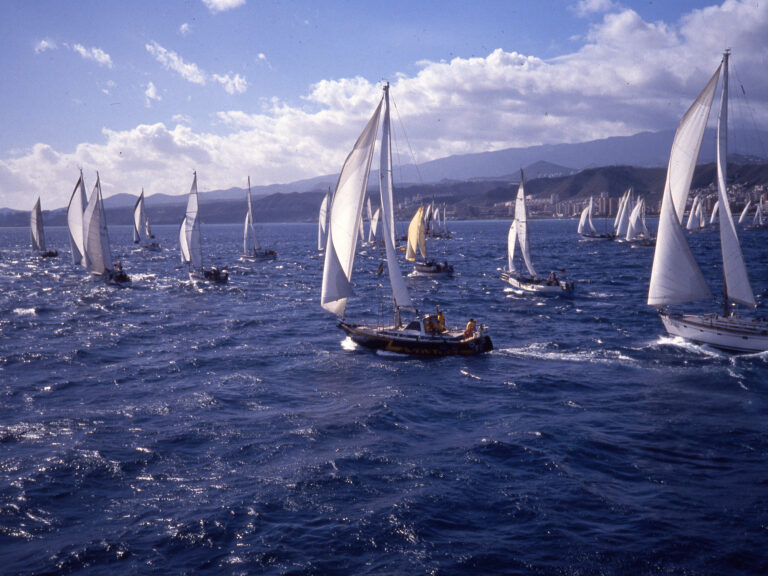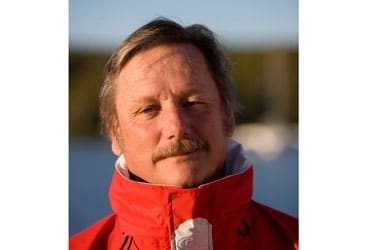
Alvah headshot 368
The passage out of Port Peterson, on Espiritu Santo, Vanuatu, was only slightly less dramatic than our entry. We just beat a line squall to the pass for an afternoon high tide, but lost the sun upon entry. Our little drill days prior paid off, as we needed to work together well to fetch clear water.
We sailed overnight to Gaua, in the Banks Islands, which were named after the legendary botanist, Sir Joseph Banks.
At dawn, I rolled over in my berth hoping to poach just a little more sleep before my watch began. That was dashed when Diana excitedly called me up on deck. An enormous burnt orange sun was rising directly behind the Mera Lava volcano to our east, lighting it up exactly as if in a state of violent eruption. We felt the same feeling of awe, humility, and vulnerability as when we once anchored in the blown rim of Krakatoa.
Vela Lava anchorage, a narrow cut in the fringing reef, fronts the island’s largest village. Once again I was directed to the wrong “Chief,” completely bewildering him with my speech and gift of twist tobacco. His English-speaking assistant was happy enough to accept the tobacco before directing me to the correct Customs Chief, Mark.
Chief Mark came out to the boat and without a hint of coyness began asking me for rope, clothes, and food. I fixed two of his spear guns, taking several hours, and gave him an array of gifts for him and his family. But in a biblical fishes and loaves fashion, the list of requests did not seem to shorten.
We love the initial ceremony of gift bearing and respectfully asking for permission to anchor, hike, swim, or fish. We also love being able to help as many families as possible, which means distributing our pile of clothes, schoolbooks, and foodstuffs beyond the first contact. But Chief Mark was not going to let us get beyond him.
I thought I would let his litany of “Simon, do you have…” become so blatant that even he would retreat in embarrassment. But he was insatiable, to some degree spoiling an otherwise pleasant stay.
Our entry finally completed, to stretch our legs we hiked to the grass airstrip a couple miles out from the village. En route we met a fresh young Peace Corp worker finishing up her first of two years as an English teacher. I felt proud to see that our nation still produces young minds and hearts selflessly committed to a better world.
Next we met a government official flying in to work on the “Multiple Indicator Project.” Even after an hour’s conversation that evening at a fund-raiser for the local school, I never did learn just what that meant.
He was a bright man, and articulate, at least until the kava, a powerful traditional drink made from a narcotic root, kicked in. Diana put a taboo on a second glass for me. I told her I only wanted to support the school, but she has my number, and reminded me about the long dingy ride home in the dark.
A drink once reserved for chiefs only, kava has now become as ubiquitous as our cold beer after a hard day’s work. As it is a soporific, drinking it to excess, a regular event here, results in nothing more harmful than the men falling asleep under a tree. Perhaps we could introduce it to Butte, Montana, on a Saturday night.
Even though I managed to shoot a couple of coral trout during our stay in Vela Lava, I was disappointed with the diving. We decided to push onto Vanua Lava, and the capital of TORBA (Torres and Banks Islands) province.
Starting with a hike up to the white cross above the scenic village, and continuing on with the many attractive, friendly people. I think this is a highlight of Vanuatu.
We met two lovely teenage girls who directed us to a home that would sell us bread. No small favor, as there had not been a supply ship in two months. We invited the girls out to the Roger Henry for a visit. Diana gave them both beautiful glass beads made by an artist friend in New Zealand. I couldn’t avoid the irony of white people still offering beads and baubles to the natives.
On Sunday we attended the Anglican Church service. The tin shed with thatched verandas was filled to overflowing because of a regional conference of clergy and wives. I have voiced my share of criticism concerning the legacy of missionaries in the South Pacific. But I have come to realize that these poor people would wither on the vine if they relied solely on their government for basic services and support. The churches are doing good and necessary work in the outback.
The ceremony was uplifting and the singing a delight. To join these people in prayer or song is to immediately break down all barriers and hesitations. Even the immigration officer, a breed normally off-standing and officious, rushed up to offer us a chair instead of the wooden benches we where about to sit on.
One of the girls’ mother, Anna, came to the boat, and through the day there arrived too many boatloads of beautiful children to count. As always, once our visitors recover from the shock of seeing such an enormous cat, Halifax becomes the main attraction. A 200-pound man asked me if it was safe to come aboard. If there was even a hint of a thievery problem in Vanuatu, I think I would encourage the myth of the killer cat. Even without that, once I tell the tale about how she kept me safe from marauding polar bears in the Arctic, she becomes an instant legend. As we walk through the thatched villages, I often hear her name being whispered in our wake.
When my many sisters first met Diana, they asked her how she did simple things on the boat like dry her hair and wash clothes. Di explained that she had never owned a hairdryer and usually did her washing on the rocks of some local stream. My sister Suzanne turned to me and said, “You should be reported to Amnesty International.”
Here in Vanuatu, Diana set out to the local stream to do the laundry, but was waylaid by Robert and Sarah of the Sola Yacht Club. They offered her the use of a tap between two of the bungalows, and even lent her a washbasin. I fear she is getting spoiled.
On their beautiful beachfront property, Robert and Sarah are struggling to create enough infrastructures to draw yachts north of Santo. They hope to soon offer fresh bread, drinking water, garbage disposal, meals, cultural ceremonies, nature tours, and cold beer. That last item should catch the yachties’ interest.
The whole town seems bent on luring tourists north; as the Tourism Officer, Charles asked that I come to his office. He heard that I had written an article in Cruising World concerning the philanthropic work Harry Hungate and Jane Lothrop, on the American yacht Cormorant, had done on the neighboring Maewo Island (“Hydro Power to the People,” March 2007).
He wanted to be sure I had not missed a single attribute of his province. Frankly, he was preaching to the choir, because I already regret not having allocated more time to this northern group before the cyclone season.
As to that season, Diana believes that as of the stroke of midnight on November 1, we have placed ourselves in dire jeopardy by not being above 5 degrees south. I think that, yes, the season is officially opened, but in reality we can dawdle a bit before retreating north out of the cyclone belt. In any event, to sail too far north too soon puts us in the end of the northern hemispheres’ typhoon season, thus a sword that cuts both ways.
The discussion continues.


